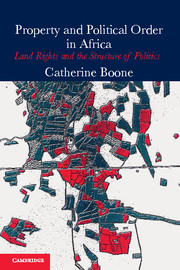Book contents
- Frontmatter
- Dedication
- Contents
- List of Figures, Tables and Maps
- Preface and Acknowledgments
- 1 Introduction
- Part I Property Rights and the Structure of Politics
- Part II
- Part III
- Part IV
- Multiparty Competition
- 9 Winning and Losing Politically Allocated Land Rights
- 10 Zimbabwe in Comparative Perspective
- 11 Conclusion
- Appendix Land Politics Cases and Sources
- References
- Index
10 - Zimbabwe in Comparative Perspective
Published online by Cambridge University Press: 05 June 2014
- Frontmatter
- Dedication
- Contents
- List of Figures, Tables and Maps
- Preface and Acknowledgments
- 1 Introduction
- Part I Property Rights and the Structure of Politics
- Part II
- Part III
- Part IV
- Multiparty Competition
- 9 Winning and Losing Politically Allocated Land Rights
- 10 Zimbabwe in Comparative Perspective
- 11 Conclusion
- Appendix Land Politics Cases and Sources
- References
- Index
Summary
Mugabe was reelected president in March 2002 by 56 per cent of the vote. The Justice Minister called it a “runaway victory” that “was won on the issue of land.”
In Zimbabwe, a statist land tenure regime (LTR) produced land-related conflict that was, in many ways, isomorphic to the land conflicts observed in the cases considered in Chapter 9. The 1970s war of national liberation was undertaken in part to “reclaim and redistribute the land.” It can be taken as an episode of land-related conflict that squares with our expectations about how statist LTRs structure land-related conflict. More recently, during 2000–2005, the invasion, takeover, and expropriation of almost 4,000 white-owned commercial farms (under the so-called Fast Track land reform program) is an episode of politicized land conflict that also squares with our predictions about how and why statist land tenure regimes can bring land conflict straight into the electoral arena. As in the cases examined in Chapter 9, the analysis of Zimbabwe concentrates on explaining the form of land-related conflict, defined in terms of the axis of competition, scale and scope of conflict, ethnicity effects, winners’ and losers’ political options, mobilizing structures, and how the government will align in a land conflict framed in “indigenes versus settlers” terms. In this case, the conflict was framed by the Mugabe government as pitting indigenous (African) Zimbabweans against white settlers.
- Type
- Chapter
- Information
- Property and Political Order in AfricaLand Rights and the Structure of Politics, pp. 296 - 308Publisher: Cambridge University PressPrint publication year: 2014



